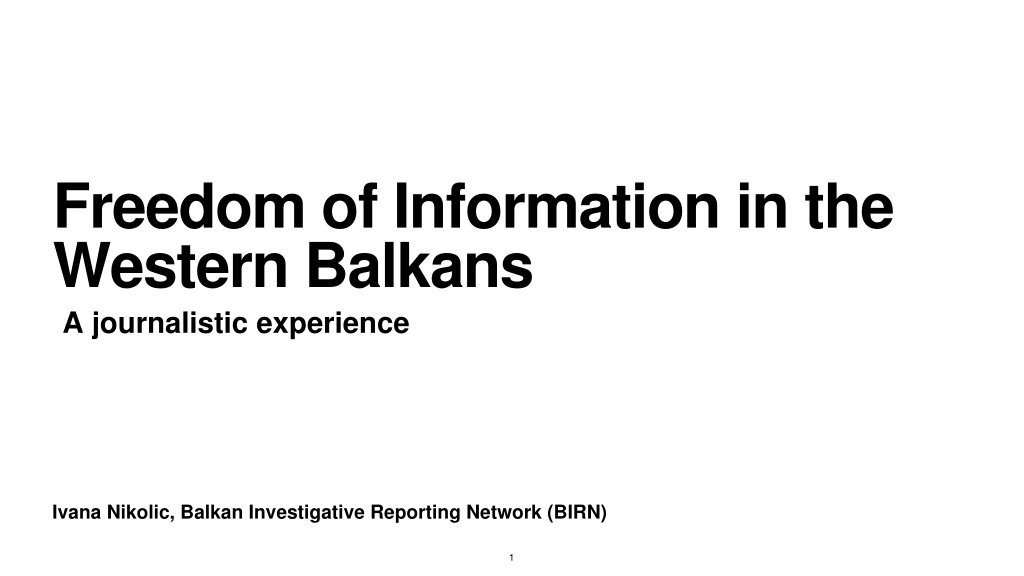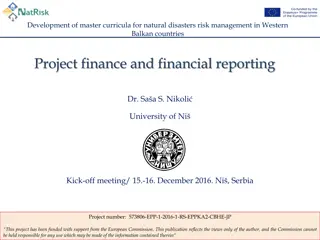Challenges in Freedom of Information: The Balkan Perspective
Monitoring Freedom of Information in the Western Balkans, the Balkan Investigative Reporting Network (BIRN) reveals obstacles faced in accessing information during the COVID-19 pandemic. Despite well-written laws, institutions failed to implement them fully, resulting in delays, rejections, and lack of transparency. The report highlights issues such as unresponsiveness, information classification, and the overall lack of urgency to provide timely and updated data.
Download Presentation

Please find below an Image/Link to download the presentation.
The content on the website is provided AS IS for your information and personal use only. It may not be sold, licensed, or shared on other websites without obtaining consent from the author. Download presentation by click this link. If you encounter any issues during the download, it is possible that the publisher has removed the file from their server.
E N D
Presentation Transcript
Freedom of Information in the Western Balkans A journalistic experience Ivana Nikolic, Balkan Investigative Reporting Network (BIRN) 1
Freedom of Information in the Western Balkans in 2020: Classified. Rejected. Delayed. BIRN has been closely monitoring freedom of information in the region for years, following legislation changes; testing institutional transparency and conducting regular interviews with relevant regional and international stakeholders. Testing institutional transparency: answered FOI requests form part of numerous in-depth and investigative stories exposing wrongdoings of governments, public and private companies and powerful figures in the Balkans and beyond. BIRN s most recent report, covering period from February to December 2020, was launched in July; the new one, which is to cover 2021, is currently being produced. 2
BIRNs 2020 statistics: 359 FOI requests submitted to 288 institutions in WB 173 approved in full In 15 cases only technical information released/or authorities said they would answer after their respective states of emergency were lifted 11 rejected (2 on the grounds that the information was classified and 9 without any clear legal reason) 160 unanswered 3
Top 20 institutions ranked on their responsiveness to FOI requests sent by BIRN journalists 4
Main findings: Balkan states generally have well-written FOI laws; however, in the first year of the pandemic, they failed to fully implement them, leaving the public in dark; transparency was another victim of COVID-19. Most countries in the region did not take into consideration FOI laws when declaring states of emergency to address the pandemic, leading to a backlog of FOI requests, unresolved complaints by independent bodies and a total lack of urgency on the part of public authorities when it came to publishing data online. The lack of transparency hindered BIRN s reporting on a number of key pandemic-related issues such as COVID-19 related public tenders in Albania, or COVID-19 regulations and statistics in Kosovo and Serbia. Many information commissioners offices face the same problems: from understaffing to a lack of continuous and constant training and office space. The interviewees also cited a lack of understanding of FOI laws on the part of public institutions and their failure to comply. A lack of political will to fully implement FOI laws; to publish information proactively and to answer FOI requests fully and timely. Only a few institutions publish information online (on their websites), but the majority of this published information is not up-to-date; almost all of the monitored institutions lack updates, delay providing access to information, often reject requests or classify the information confidential , so that no access is granted to journalists or the public. 5
Recommendations Freedom of Information Officers (more powers should be granted; capacities strengthened in terms of budgets and staff; out of political interference;) Public institutions should receive regular trainings on FOI laws and be obliged to publish all their decisions, records, spending and financial budgets online; additionally, stronger fines should be imposed on institutions that do not answer FOI requests, and a record kept of public servants who actively deny or do not answer FOI requests, backed by legal sanctions. A nationwide online register should be established of all FOI requests sent to all public institutions, along with their responses and published documents. This register should be publicly available, easily accessible and searchable. This way, members of the public would not have to file new FOI requests for documents that have already been made public. Civil society representatives, journalists and media experts should be invited to actively participate when the government is seeking to make any changes to FOI laws. Restrictions to FOI laws during any declared state of emergency should be eliminated. 6
Open Data: What Information Should Be There? 7
BIRNs journalists experience with using open data portals: Albania There are few functional databases; they are not user-friendly and not easily searchable. Court decisions are also hard to find online (some courts anonymize them or delete them after a while). Many official databases and institutional websites have only basic information. Bosnia Proactive transparency is still far away. Some institutions publish data, while some others have nothing on their websites. The lower you go, the worse it gets; on a state level things are better as there are pressures to open data. Two things that are generally well covered are budgets and public procurements. Judiciary is especially bad when it comes to proactive transparency: indictments are not published, verdicts only often. Kosovo State open data portals are not very user friendly, they are outdated, decentralized and in some cases differ in different institutions; Some of these municipality open data portals are better than the others and are updated; but in terms of data published, the portals are not very good. 8
BIRNs journalists experience with using open data portals: Serbia Open data portal is not user/friendly, and rather stores theoretical than useful information. A portal of the courts is in general OK, except that you can only get information if you have a specific case registration number. Its huge downfall is that it does not store any data from two special courts - for organised crime and for war crimes. Besides, some portal s online archives do not exist, so you have to go to their premises physically to search for information you need. North Macedonia Open Finance, used by BIRN journalists (all government transactions are listed on the webiste - for example, if someone receives money from an institution, it is disclosed - except for the salary. It is very useful for tenders and similar investigations) Montenegro Not all institutions publish data; those that do often publish information just for the sake of publishing (for instance, there are lists of various lawyers, NGOs, appointed judges etc). While there are financial information about NGOs, there are no such data for political parties 9
Open data portals & proactive transparency: common concerns Data not regularly updated for the sake of publishing, not because the main goals are supposed to be data s relevance, timing, easy access and political relevance Outdated statistics in some countries Inconsistencies in publishing data Some formats are not user- friendly Sometimes data is published only 10
,,All five countries from the region have failed to become more transparent and digitally accessible. Some set too many commitments (like North Macedonia), thus failing to make concrete progress in crucial sectors. Others were too ambitious to set high commitments and were not able to make any progress at all (like Bosnia and Herzegovina). Publishing latest updates on their websites, such as financial reports, ministry meetings minutes, or other current and important public documents, seems like too long a process ever to be fully implemented. BIRN Freedom of Information Report 11























